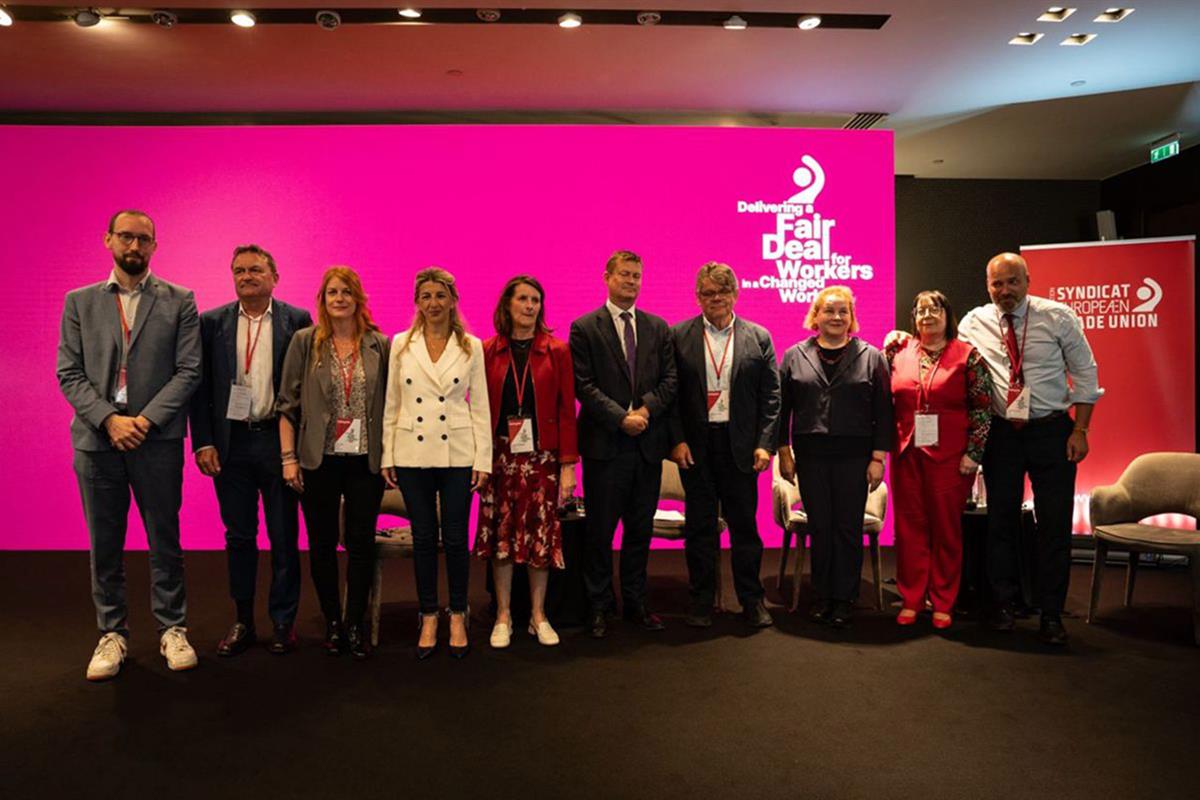In Belgrade, Yolanda Díaz defends a "Europe with redistributive power, democratic control and social ambition"
News - 2025.5.20
 The Second Vice-President and Minister for Work and Social Economy, Yolanda Díaz, at the meeting of the European Trade Union Confederation (ETUC)
The Second Vice-President and Minister for Work and Social Economy, Yolanda Díaz, at the meeting of the European Trade Union Confederation (ETUC)
The Second Vice-President and Minister for Work and Social Economy, Yolanda Díaz, has defended in Belgrade, during the meeting of the European Trade Union Confederation (ETUC), the work of trade unions to achieve a more social Europe in the face of the complex international panorama faced by the 27 countries of the European Union (EU).
Díaz stressed the need to make progress on the European project in order to preserve it. "Let us together, despite our differences, build a progressive European agenda," she insisted at the ETUC's interim conference, which is meeting in the Serbian capital under the title "Getting a fair deal for workers in a changing world".
The vice-president is taking part in the ministerial debate organised by the ETUC (European Trade Union Confederation) which, through its more than 90 trade union confederations in the 27 countries of the European Union (EU), promotes decent living and working conditions. It has some 60 million members and is recognised by the EU authorities as the only representative cross-sectoral trade union organisation at a European level. CES therefore drafts responses to the European Commission's proposals and collaborates with MEPs, as well as participating in various European consultative bodies.
In a debate with her counterparts from the United Kingdom, Justin Madders, and Austria, Korinna Schumann, the Labour Minister recalled how previous decades' policies sacrificed the social dimension in favour of "economic freedoms", resulting in deregulation and dismantling. These policies were accentuated by the contested response to the 2008 financial crisis. However, the way in which the consequences of the pandemic were dealt with has shown that the promotion of workers' rights is beneficial for society as a whole and therefore also for business.
Shielding progress on European rights
"There is an urgent need to protect progress with a binding social clause in the Treaties: that fundamental rights should prevail over the economic freedoms of a few when these come into conflict", insisted Díaz, who has set Spain as an example that rights are not an obstacle to economic development, but the "only way towards growth that is worthy of the name".
Now, the vice-president reiterated, the time has come for the reduction of working hours without any reduction in wages, which has been the result of social dialogue, an instrument that she valued and defended for its legitimising power.
Another pending battle is rest time, which is why she has called for progress on a European directive on the right to disconnection. "We want binding legislation to ensure that no worker can be penalised for exercising their right to their own time," Díaz stressed.
Democracy at work
The vice-president also called for a deepening of workplace democracy. She explained the setting up in Spain of an International Commission of Experts on this matter and defended a proposal that goes beyond the German or Scandinavian model, one that would become "a new standard of economic democracy at a European level".
A Europe of rights
"This is what we stand for: a Europe that is not just a market, but a community of rights", said the minister, who called for joint action by trade unions to defend social rights, whether national, European or international.
"The alternative is more Europe, but a Europe with redistributive power, democratic control and social ambition", she concluded.
Bilateral meetings with Lynch and Röpke
On the fringes of the trade union meeting, the vice-president met ETUC Secretary General Esther Lynch and the President of the European Economic and Social Council, Oliver Röpke. With both she plans to discuss the future of pending European directives and proposals to promote social dialogue.
Non official translation




